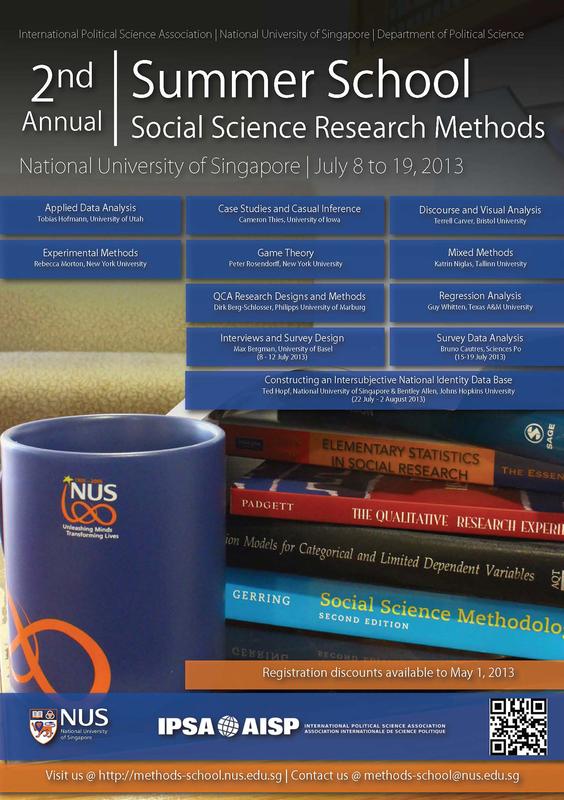 IPSA-NUS 2nd Summer School for Social Science Research Methods 2013
IPSA-NUS 2nd Summer School for Social Science Research Methods 2013
July 8, 2013 - July 19, 2013
National University of Singapore
Singapore
The 2nd Annual IPSA-NUS Summer School for Social Science Research Methods took place in Singapore in July 2013. It was hosted by the National University of Singapore's Department of Political Science.
The IPSA-NUS Methods School offered rigorous training in a wide variety of social science research methods. The more than 100 participants from all over the Asia-Pacific, Europe, and the U.S. were able to choose between nine courses:
Applied Data Analysis (Tobias Hofmann, University of Utah)
Constructing an Intersubjective National Identity Data Base (Bentley Allan, Johns Hopkins University, and Ted Hopf, National University of Singapore)
Discourse and Visual Analysis (Terrell Carver, University of Bristol)
Experimental Methods (Rebecca Morton, New York University)
Game Theory (Peter Rosendorff, New York University)
Interviews and Survey Design (Max Bergman, University of Basel)
Qualitative Comparative Analysis (Dirk Berg-Schlosser, Philipps University of Marburg)
Regression Analysis (Guy Whitten, Texas A&M University)
Survey Data Analysis (Bruno Cautrès, Sciences-Po, Paris)
The participants and instructors met each morning in the seminar room, and the afternoons were reserved for lab sessions and hands-on exercises. In addition to the regular class meetings, the Methods School organized evening talks and info sessions on topics like the Politics of Singapore, Analyzing Complex Processes, and Publishing Academic Books and Journal Articles as well as a number of social activities and events.
The Methods School was a huge success and has established itself as the leading training program for social science research methods in the Asia-Pacific. It did not only provide participants with an excellent learning experience, but invaluable opportunities to build and develop a global network of students, post-doctoral fellows, university faculty, civil servants, and private sector researchers with an interest in advanced quantitative, qualitative, and formal research methods.











